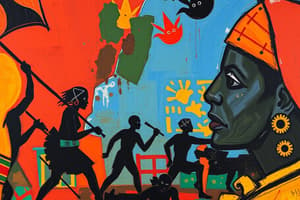Podcast
Questions and Answers
What was the Haitian Revolution?
What was the Haitian Revolution?
- A French colonial uprising.
- A war for independence from Britain.
- A political revolution in Haiti.
- A rebellion by slaves against white landowners. (correct)
Who proposed two amendments to the Missouri statehood bill?
Who proposed two amendments to the Missouri statehood bill?
James Tallmadge
What title was Henry Clay known as?
What title was Henry Clay known as?
- The Missouri Leader
- The Senator of Freedom
- The War Hawk
- The Great Compromiser (correct)
What was the Missouri Compromise?
What was the Missouri Compromise?
What did the Whig Party oppose?
What did the Whig Party oppose?
Which president campaigned on Manifest Destiny?
Which president campaigned on Manifest Destiny?
Who was a major figure in the abolitionist movement that escaped slavery?
Who was a major figure in the abolitionist movement that escaped slavery?
Who was Sojourner Truth?
Who was Sojourner Truth?
What was the purpose of the Wilmot Proviso?
What was the purpose of the Wilmot Proviso?
Flashcards are hidden until you start studying
Study Notes
Haitian Revolution
- Slaves in Haiti revolted against white landowners inspired by French ideas of liberty and independence.
James Tallmadge
- New York Congressman who proposed amendments for Missouri's statehood: freeing slaves born in Missouri at age 25 and banning the import of slaves once it became a state.
Henry Clay
- Prominent Kentucky senator known as "The Great Compromiser."
- Ran for president five times; key in crafting the Missouri Compromise and outlined the Compromise of 1850.
Missouri Compromise
- Established in 1820 to maintain the balance between slave and free states.
- Missouri entered as a slave state, Maine as a free state; all other states north of Missouri's southern boundary were to be free.
Whig Party
- Formed in the mid-1830s, opposing President Jackson's leadership style.
- Advocated for protective tariffs and federal funding for internal improvements, but faded by the 1850s.
James K. Polk
- Southern Democrat and "dark horse" president elected in 1844.
- Advocated for Manifest Destiny; significant territorial gains included Texas and Oregon; oversaw the Mexican War and the Treaty of Guadalupe Hidalgo.
Frederick Douglass
- Influential abolitionist and speaker whose writings challenged perceptions of slaves as non-intelligent.
- Transitioned from a victim of slavery to an empowered advocate against the institution.
Sojourner Truth
- Former slave and prominent Black abolitionist who spoke against both slavery and for women's rights.
- Faced prejudice but became a key figure in the abolitionist movement.
Harriet Tubman
- Former slave known as a conductor on the Underground Railroad, aiding others to escape to freedom from the 1820s to 1913.
Wilmot Proviso
- Proposed legislation aimed at banning slavery in territories acquired after the Mexican War.
Mexican War
- Conflict from 1846 to 1848 between the U.S. and Mexico, leading to significant territorial expansion for the United States.
Free Soil Party
- Political party formed in opposition to the expansion of slavery into the western territories.
Salmon P. Chase
- Prominent politician and abolitionist known for his opposition to slavery and role in the formation of the Republican Party.
Seneca Falls
- Location of the first women's rights convention in 1848, highlighting women's suffrage and rights.
Zachary Taylor
- Whig president who served from 1849 until his death in 1850; a military hero with no political experience before taking office.
Deseret
- Proposed state by Mormon settlers in the West, showcasing their desire for self-governance during westward expansion.
Compromise of 1850
- Series of legislative measures aimed at resolving tensions between free and slave states, including the admission of California as a free state.
Fugitive Slave Act
- Law passed as part of the Compromise of 1850; mandated that escaped slaves be returned to their owners.
Harriet Beecher Stowe
- Author of "Uncle Tom's Cabin," a novel that galvanized anti-slavery sentiment in the North.
Stephen A. Douglas
- Senator who advocated for the Kansas-Nebraska Act, promoting popular sovereignty to decide on slavery in new territories.
Kansas-Nebraska Act
- 1854 legislation that created the territories of Kansas and Nebraska, allowing residents to determine the legality of slavery.
Anthony Burns
- Enslaved African American whose attempted escape and subsequent capture in Boston heightened tensions around the Fugitive Slave Act.
Know Nothings
- Political group in the 1850s characterized by nativist attitudes, opposing immigration and Catholicism.
Republican Party
- Founded in the 1850s, emerging as a major political force opposing the expansion of slavery into the western territories.
Charles Sumner
- Abolitionist senator known for his outspoken criticism of slavery and antislavery rhetoric.
Andrew Butler
- Senator from South Carolina and a pro-slavery advocate; targeted by Charles Sumner's speeches.
Preston Brooks
- Representative from South Carolina who infamously assaulted Charles Sumner on the Senate floor in defense of slaveholders.
John Brown
- Radical abolitionist known for his violent efforts to combat slavery, including the raid on Harpers Ferry in 1859.
John Charles Fremont
- Explorer and politician who played a significant role in the promotion of Republican ideology and the abolitionist cause.
Studying That Suits You
Use AI to generate personalized quizzes and flashcards to suit your learning preferences.




